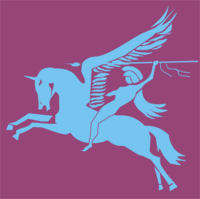| 9th (Eastern and Home Counties) Parachute Battalion | |
|---|---|
 Cap badge of the Parachute Regiment | |
| Active | 1942–1947 |
| Country | |
| Branch | |
| Type | Airborne forces |
| Role | Parachute infantry |
| Size | Battalion |
| Part of | 3rd Parachute Brigade |
| Nickname(s) | Red Devils[1] |
| Motto(s) | Utrinque Paratus (Latin for "Ready for Anything") |
| Engagements | Normandy landings Battle of the Bulge River Rhine crossing |
| Commanders | |
| Notable commanders | Lieutenant Colonel James Hill Lieutenant Colonel Terence Otway Lieutenant Colonel Napier Crookenden |
| Insignia | |
| The emblem of the Second World War British Airborne Forces, Bellerophon riding the flying horse Pegasus |  |
The 9th (Eastern and Home Counties) Parachute Battalion was an airborne infantry battalion of the Parachute Regiment, raised by the British Army during the Second World War. The battalion was created in late 1942 by the conversion of the 10th Battalion, Essex Regiment to parachute duties. The battalion was assigned to the 3rd Parachute Brigade, alongside the 7th (later the 1st Canadian Parachute Battalion) and 8th Parachute battalions, then part of the 1st Airborne Division but was later transferred to the 6th Airborne Division.
The 9th Parachute Battalion took part in two major parachute landings in the Normandy invasion, and the River Rhine crossing in Germany. In Normandy they were responsible for the attack on the Merville Gun Battery, which, if not eliminated, could pose a danger to the Normandy landings.
After the war the battalion was sent to Palestine on internal security operations with the rest of the 6th Airborne Division in Palestine. Post-war army reductions in 1948 saw the battalion being amalgamated with the 8th (Midlands) Parachute Battalion (which had served with the 9th in 3 Para Brigade) as the 8th/9th Parachute Battalion, but by the end of the year the new battalion had been disbanded.
- ^ Otway, p.88